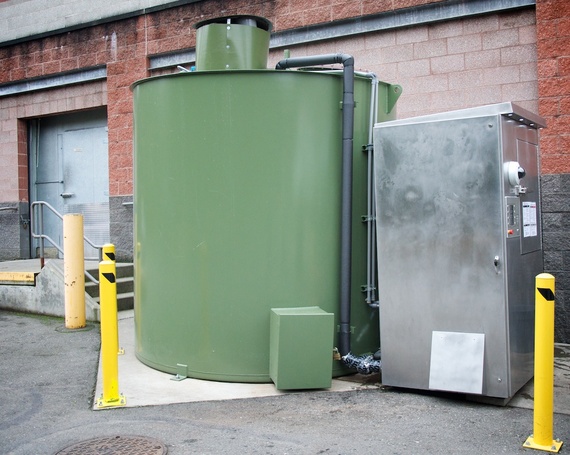On a planet where one in eight people is chronically hungry, it's an almost unimaginable irony: every year, one-third of the world's food supply is wasted.
Here in the U.S., we send 34 million tons of food to the landfill annually, at great cost to our natural resources (water and energy to grow and raise those squandered crops and livestock, plus pollution from unnecessary pesticides and fertilizer); the climate (landfilled food waste emits methane, a greenhouse gas at least 23 times more potent than carbon dioxide in the short term); and our citizens (50 million without enough to eat).
Composting, rather than landfilling, tackles the methane problem by transforming rotting trash into valuable nutrients that can capture carbon and improve soil health. It's great that curbside composting programs, for one, have seen a serious uptick over the past year. But they don't address the bigger picture issue: how can we minimize the monumental amount of food waste to begin with? It's pointless to even ponder the future of feeding a planet of seven billion and counting until we address this.
Thankfully, there are smart minds who have been thinking about these things, like Larry LeSueur and Jose Lugo, two former Microsoft men who have turned their tech expertise toward tackling food waste with their start-up, WISErg.
The company's "Harvester" machine, geared as a solution for grocery stores, large restaurants and commercial kitchens, can -- using roughly the same amount of energy as a home refrigerator -- process up to 4,000 pounds of food scraps a day; first into a slurry-like material via the Harvester, then refined further into a liquid organic fertilizer off-site using a patent-pending oxidative conversion process. The fertilizer can even be sold back to a grocery store's customers or used on local farms, closing the waste loop altogether.
Unlike the smelly, leaching dumpster or compost container out back where many a grocery store or restaurant tosses its food waste, the Harvester collection method is odor-free. Nearly any kind of food scrap can be put inside, including meat, bones, baked goods, deli leftovers, flowers -- even "compostable" paper goods and utensils that usually wind up in the landfill because no traditional composting facility wants to deal with them.
The real breakthrough, however, has to do with the company's tracking technology (here's where those Microsoft backgrounds come into play), which is kind of like biofeedback for food wasters: Every morsel that enters the Harvester is identified by category (e.g., produce trimmings, seafood, deli), weighed and visually monitored via the cloud, allowing WISErg to tell users, specifically, what and how much of what they're tossing.
"We're not a waste disposal company, we are a data and a nutrient extraction company," LeSueur, WISErg's CEO, told me via phone last week. "And because of that, we're able to collect intelligent data -- what a customer is throwing away -- to help them prevent the need to throw it away." He believes that with the help of this kind of information, the average store using the Harvester technology will be able to examine the root causes of its food waste, minimizing overstock and saving $2,000 to $6,000 a month in avoidable inventory loss.
As of now, WISErg has three Harvesters in markets in the Seattle area (PCC Natural Markets signed up for the initial pilot run), with two more slated for delivery next month and plans to roll out another two to three a month going forward. The company is also "in ongoing conversations with several national brands," though no specifics have been revealed yet.
If you want see the Harvester in action, local NBC affiliate KING 5 News ran a nice piece on the Harvester last week. You can see it here.
Got a great idea for my next Innovation Earth column? Send tips, thoughts and suggestions to jennifer@jennifergrayson.com.

